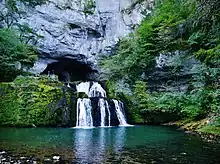
Source of the Lison
The Lison is a river in Franche-Comté in France, in the Department of Doubs. It rises near Nans-sous-Sainte-Anne and flows past Cussey-sur-Lison and Échay, emptying into the Loue.[1]
The river's source, a waterfall emanating from a cave, is a popular tourist attraction that was threatened by industrialization in the late nineteenth-century, and its protection spurred the development of the French conservation movement.[2] The Source of the Lison is the title and subject of several paintings by Gustave Courbet, at least one of which was painted at the site.[3][4]
References
- ↑ Rousset, Alphonse (1863). Géographie du Doubs. Paris: Librarie Classique de Paul Dupont. p. 11.
- ↑ Mathis, Charles-François (2014). "Nation and Nature Preservation in France and England in the Nineteenth Century". Environment and History. 20 (1): 38. ISSN 0967-3407.
- ↑ Morton, Mary G. (2006). Courbet and the Modern Landscape. Los Angeles: J. Paul Getty Museum. ISBN 9780892368365.
- ↑ Chu, Petra ten-Doesschate (2013). "Showing Making in Courbet's The Painter's Studio". Hiding Making - Showing Creation. Amsterdam University Press: 68.
This article is issued from Wikipedia. The text is licensed under Creative Commons - Attribution - Sharealike. Additional terms may apply for the media files.